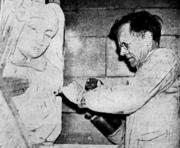|
|
||||||||||||||||||||||||
 |
Featured person
Recently added |
Lydia Mary Foster (1867 - 1943): |
||||||||||||||||||||||
Lydia Mary Foster published novels and short stories depicting the inhabitants of her native County Tyrone; she grew up a daughter of the manse at Newmills, near Coalisland in that county, where her father Rev James Foster was Minister of Newmills Presbyterian Church; he was the second incumbent of that church, and wrote an account of the 1859 Evangelical (Fundamentalist Protestant) Revival in Ulster as it worked itself out in the district. He was a friend of Henry Cooke, the prominent Presbyterian cleric; when issued with a "call" to Newmills (this is the Presbyterian Church's expression for being offered a position with a congregation), Foster balked slightly at the offered terms, and asked Cooke his advice: the answer was to accept the "call", and work harder.
Lydia Mary was the second daughter and fourth of six children, and named after her mother. Her eldest brother Nevin H Foster was manager of the Hillsborough Linen Company; also a keen ornithologist he contributed to the column "Nature Notes" in the Northern Whig, a prominent Belfast newspaper of the time. Lydia was educated at a small school, Holywood, County Down. She established with her two sisters a private school, the Ladies' Collegiate School, Balmoral, which flourished for 20 years at three addresses in the Balmoral area of south Belfast, until the two sisters died, in 1917 and 1918 and Lydia herself began to suffer from increasing deafness through the 1920s. For this, and financial, reasons, she turned to writing, publishing short stories, plays, verse and poetry in magazines such as "Ulster Parade", a light-hearted collection of local writing, enough to ensure the frugal Lydia a modest income. She remained in Belfast, living in the third of the school addresses, until the early 1940s, latterly along with another single lady, who was traumatised by the air raids on Belfast. Foster herself, almost totally deaf and living several miles away from the targets, took the raids with relative equanimity.
Foster published several books, of a genre often described as "kailyard" (a Sottish term meaning "vegetable garden", "Kail" being a kind of cabbage: The Bush that Burned (published 1930; the title is a reference to one of the symbols of the Presbyterian Church in Ireland, itself in turn a reference to a biblical story of Moses) concerns a man from Tyrone who moves to Belfast where he trains for the Presbyterian ministry, returns to Tyrone, marries and lives out his life. There is no plot apart from this, but "the quaint dialect is faithfully rendered". It became a best seller locally but was reviewed favourably- as far away as London and Dublin - the Irish Independent described it as a "brilliant portrayal of Presbyterian life". Tyrone among the Bushes (1933) is a collection of sketches, stories and verse, depicting ordinary people in Tyrone, of all religious backgrounds, "with humour and understanding", while in the essentially autobiographical Manse Larks (1936) Foster recalls many of the characters she knew as a child. Elders' Daughters (1942) is more of the same fare, again notable for its rendering of local speech. "As an interpreter of the life, manners, character and prejudices of Ulster Presbyterians, she stands unrivalled." The book had sold out two editions by the time of her death in December 1943, by which time she was living with a niece at "Hollowbridge", her house near Hillsborough.
| Born: | 1867 |
| Died: | 1943 |
| Richard Froggatt |
| Acknowledgements: Kate Newmann, Wesley McCann |
| Bibliography: Desmond Browne: Ireland in Fiction vol 2 (by Stephen Brown and Desmond Clarke), Cork 1985; John T Carson: The Rev. James Foster of Newmills, Co. Tyrone, 1850-1890 : and “the bush that burned” in Tyrone; http://www.ricorso.net/rx/az-data/authors/f/Foster_LM/life.htm |


Home | Our Policies | Plaques | Browse | Search | Sponsors | Links | Help | Contact
Privacy & Disclaimer | Cookie Policy | Site Map | Website Design By K-Point
© 2024 Ulster History Circle









